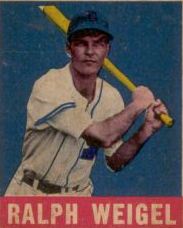

|
|
Ralph Weigel
Date and Place of Birth: October 2, 1921 Coldwater, Ohio
Died: April 15, 1992 Memphis, Tennessee
Baseball Experience:
Major League
Position:
Catcher
Rank:
Lieutenant (junior grade)
Military Unit: US
Coast Guard
Area Served: Pacific Theater of Operations
 Ralph
R Weigel was born on October 2, 1921 in
Ralph
R Weigel was born on October 2, 1921 in
In 1941, Weigel joined the Charleston Senators of the Mid-Atlantic League – a Cleveland Indians farm club. He got off to a slow start that year and batted just .226 for the season but turned things around in 1942, batting .306 and helping the Senators to the league pennant.
In 1943, Weigel joined the Coast Guard. He was
stationed at
In October 1943 he went to officers' school at
"My Dad did tell me that he led the gun crew on his ship [they only had one gun -- perhaps a 5-inch] and that he believed that they shot down a kamikaze during the Battle of Leyte Gulf. His Captain was Malcolm Bell who wrote a letter to my Mom, my sister, and me in the the late 1980's to let us know how thankful he and his crew were to have had the "Big Backstop" as the Executive Officer and Navigator, especially during one horrible storm in the Pacific after the convoy had been scattered to avoid submarines. Captain Bell said that he never doubted that Dad would get them back to the convoy rendezvous point in spite of the storm.
"When I asked Dad about that storm, he told me the following story. He had sited a very tall group of palm trees on an island near the horizon just before the storm hit. He plotted the rendezvous course, reviewed it with Captain Bell, and went to his bunk for some much needed sleep. About 4 hours later, Captain Bell sent someone to get Dad back up to the Bridge to try to find out where they were -- since he figured that they should be very near the rendezvous point, but nothing looked right. They had been moving along the plotted course at near their maximum speed of around 12-15 knots. After checking all his prior calculations, Dad said that he felt just as confused as Captain Bell. Then he took the binoculars up to the lookouts level for a look, and he could not believe his eyes! Exactly where he had sighted it over 4 hours ago was the group of tall palm trees. He went back and explained to Captain Bell that the storm essentially had held the ship in place for the 4 hours of darkness!"
Weigel was discharged from service in November 1945 as a lieutenant (junior grade). He was with the Cleveland Indians for spring training in 1946 but optioned to the Wilkes-Barre Barons of the Eastern League on April 1. In 95 games he batted .288 for the Barons and was recalled by the Indians in September, making his major league debut on the 18th.
In 1947, the Indians assigned Weigel to the
International League’s Baltimore Orioles where he batted .282 in 110
games. He was traded to the White Sox in January 1948 and played 66
games for the
"About the same time as we received the letter from Captain Bell," adds John Weigel, "Mom showed us a letter from Hall of Famer Ted Lyons, my Dad's manager in his rookie season in the majors in 1948. In that letter, Ted said that in his role as a scout for the White Sox, he always encouraged his prospects to get as much education as possible because they could never know when a freak accident might end their baseball career. As an example, he would tell them the story of how Dad had caught his spikes on his left foot while trying to get out of the way of a high inside fastball from the legendary Virgil "Fire" Trucks. The torque on Dad's knee when he fell tore what we now know as the ACL and the lateral meniscus (cartilage). There was no ACL surgery back then. Today, the general rehab from that procedure for a professional athlete is nearly a full year; my Dad was only out of the line-up for a month and was back catching a full game within 6 weeks from the date of the injury. In those days, a catcher with a "trick knee" -- which is what results from not having a strong ACL to keep the kneecap stable -- had little hope of ever again catching on a regular basis. In his letter, Ted said that he told the prospects that he truly believed that Dad had been on the verge of becoming the starting catcher and that he would have been a fine major league player for years to come.
Ralph Weigel passed away in
Thanks to Ralph's son, Dr. John R. Weigel, for help with this biography.
Created August 25, 2008. Updated May 9, 2009.
Copyright © 2009 Gary Bedingfield (Baseball in Wartime). All Rights Reserved.